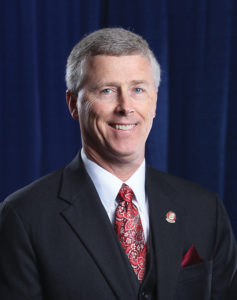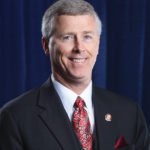
David Cockrell, OD, who practices at Cockrell Eyecare Center, a Keplr Vision practice in Stillwater, Okla.
Sponsored Content
By David Cockrell, OD
Oct. 7, 2020
The concept of scope of practice is one that is all too familiar to licensed optometrists throughout the U.S. As a result of state-specific legislation, practicing optometry is a very different profession depending on where the practitioner is located.
Currently, only Alaska, Arkansas, Indiana, Kentucky, Louisiana and Oklahoma allow optometrists to perform all procedures to the full scope of their licensure and education. From an optometrist’s standpoint, it can be a big consideration when choosing where to practice. But from a business standpoint, it can mean so much more.
I believe as the utilization of healthcare expands to include increased medical care by optometrists, patients will choose to access providers with the broadest offerings, and their third-party payers, including traditional medical insurance models and managed medical care plans, will reinforce those decisions as they work to manage expense. The more procedures and treatment options ODs can provide, the more value they will bring to the system, which ultimately means the likelihood of greater long-term economic stability for both the doctor and his/her practice.
Moving from a Refractive Care Model to a Medical Care Model
The need for more advanced, medically focused optometry is growing as lifespans and the ocular manifestations of age-related disease increase. This requires ODs to move into a broader medical care model as opposed to a refractive care model. The comprehensive ocular health of a patient grows far more important with age – whether we’re diagnosing and treating a disease like glaucoma or the ocular manifestations of systemic disease in the patient’s general health.
Our practice in Stillwater, Okla., has been successful at increasing area residents’ access to eyecare because of the expanded scope of practice in the state. We provide eyecare to all ages – from the most routine eye exams to the most current forms of laser procedures. Our patients establish relationships with our ODs and team members, knowing the great majority of eyecare they will need will be provided by our office.
As the population of the U.S. rises, optometry is continuing to increase in our number of practicing ODs while ophthalmology numbers are decreasing. Expanding our scope of care allows us to meet a mounting unmet demand. Currently in every state, an optometrist with extensive training in eye disease and advanced diagnostic equipment is readily available, instead of a family physician or emergency room doctor. There is simply a limitation on the care they can each provide based on existing differences in the legislative statute, not education or training.
Change Starts at the State Level
For the past 30 years, I have been privileged to participate in an advocacy role in Oklahoma with our state association and with the American Optometric Association and other optometric entities working toward optometrists’ increased access to patient care.
Another Article to Explore
Moving our profession forward both at the state and national level starts with personal involvement as members of our State Optometric Associations and then as active members of the AOA. Personal advocacy in legislation to change scope of practice in conjunction with our state associations’ efforts is how we increase the options for the care we provide.
At the same time, legislative changes may be required to resolve insurance plan participation barriers, payment inequities and multiple other challenges. Advocacy needs to move toward a common legislative statute that grants authority to our state boards of optometry, giving them the authority to delegate and monitor the practice of optometry without pressure from outside sources.
Beginning in the 1970s, the movement to expand the scope of practice began a track record of nearly 50 years of success. Significant changes in optometric privileges in just the last 20 years have put optometry in a good position to continued progress in every state. It is up to each of us to continue our profession’s advancement.
Keplr Advocacy
When I recently chose to partner with Keplr Vision, I did so because the fundamental beliefs of the organization align with those of optometry and are congruent with the AOA’s vision – to create the brightest future possible for our practices. I believe that being part of Keplr Vision will help to ensure we can continue to provide our patients with the broadest access to medical optometric care.
Those beliefs have become even more apparent with the launch of the Keplr Advocacy initiative. Keplr Advocacy was created to pursue policy and regulatory changes at the state and federal levels by working with our Keplr doctors to expand and protect the practice of optometry and thereby allow Keplr Vision providers to practice the highest level of care while increasing access to the patients that we ultimately serve.
I look forward to serving on this inaugural Keplr Advocacy committee, alongside my colleagues’ – fellow OD leaders: Keplr Vision chief medical officer Dr. Ben Gaddie, and Keplr Vision Partner Doctors: Dr. David Nelson and former Louisiana State Senator Dr. David Heitmeier. We aim to create an open discussion amongst all Keplr Vision Partner Doctors where we can positively affect the outcomes on a broader, more nationwide scale.
In addition to efforts around the scope of optometry, we are invested in advocacy efforts regarding the recent amendment of the Federal Trade Commission’s contact lens rule. The impact on eyecare providers, especially while dealing with the economic burdens of the COVID-19 pandemic is concerning, to say the least, as it adds undue administrative burdens on prescribers while also allowing for less optometric oversight of patient ocular health.
As we all know, optometry is the primary eyecare profession, and it is up to each of us working together to continue to remove barriers to access to full scope optometric care for our patients. I look forward to continuing those efforts together with Keplr Advocacy and my fellow Keplr Vision partner doctors to help optometry achieve our goals.

David Cockrell, OD, practices at Cockrell Eyecare Center, a Keplr Vision practice in Stillwater, Okla. To contact him: dcockrell@cockrelleyecare.com























